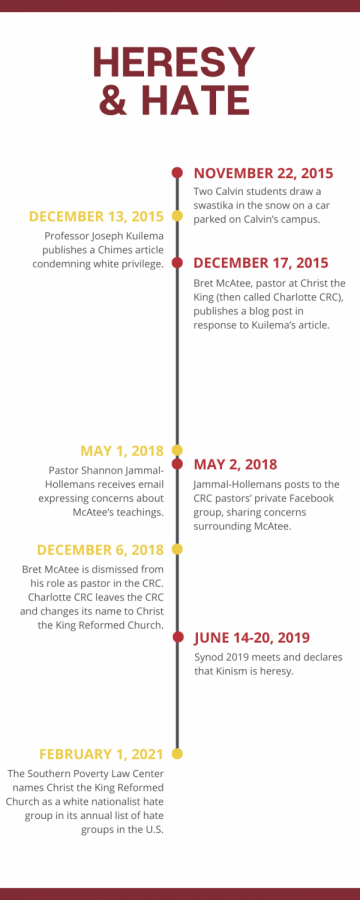Ex-CRC church added to list of hate groups
Church’s pastor targeted Calvin professor in 2015 blog post
A timeline of the various events mentioned in the article.
Pastor Bret McAtee stood at the pulpit, passionately praying, “That God might save America again. That God might once again invigorate the White man to be the champions and the heralds of God’s great grace.”
His voice wavered in front of the congregation at Christ the King Reformed Church in Charlotte, Michigan. Two signs bearing the phrases, “Joy to the world” and “Peace on earth” flank the pastor’s sides. “What’s wrong,” he demanded, choking with emotion, “with that kind of love and passion for your people?”
McAtee’s promotion of Kinism, a white supremacist teaching that advocates for the separation of tribes or kins, in worship services like this one in January, led to the removal of Christ the King—then called Charlotte Christian Reformed Church—from the CRC in December 2018.
The Southern Poverty Law Center named Christ the King to its list of white nationalist hate groups in February. Christ the King did not respond to repeated requests for comment.
Back in 2015, before his church was banished from the CRC and added to the hate groups list, McAtee targeted Calvin University professor Joseph Kuilema after Kuilema published an opinion article in Chimes.
Kuilema’s article was a response to an incident in which two students drew a swastika and the phrase “white power” in the snow on a parked car on Calvin’s campus. Many members of the Calvin community denounced the act, claiming it did not accurately represent Calvin. Kuilema disagreed.
“There’s always this narrative whenever something racist happens that this is not who we are. And that’s just not true,” Kuilema said recently, recounting the reaction to the 2015 incident. “One of the things I was trying to point out in 2015 was that this has been and continues to be a part of the history of Calvin University.”
Kuilema challenged the Calvin community to not only condemn white supremacy but also white privilege, writing in the article, “It must be clearly stated that those who deny white privilege functionally believe in white supremacy, whether they have the courage to write it on a car or not.”
Kuilema said he expected the article to simply start a conversation within the Calvin community, but the article ended up gaining international attention, receiving both praise and criticism. Among the critics was Bret McAtee, who wrote a response to the article in a post to his “Iron Ink” blog. McAtee took offense to Kuilema’s claim that people who do not acknowledge white privilege are white supremacists. Regarding white privilege, McAtee wrote, “It’s [sic] intent, as used by cultural Marxists of all colors, is to find a way to guilt Christian white people… into surrendering their inheritance and contribute to a slow destruction of their generations.”
Kuilema was alerted to the post in 2018, when members of the CRC’s Office of Social Justice were beginning to uncover what was happening at Charlotte CRC. On May 1, 2018, Pastor Shannon Jammal-Hollemans, then serving as a racial justice team leader for the CRC, received an email alerting her to McAtee’s promotion of Kinism.
Digging into Charlotte CRC’s history, Jammal-Hollemans found that this wasn’t the first time concerns had been raised about McAtee’s problematic teachings.
“Because there didn’t seem to be much that was happening on the level of denominational leadership, I decided to step outside of the usual way of handling these things and post about it on the Christian Reformed Church pastors’ Facebook page,” Jammal-Hollemans said.
While some members of the group shared her concern, others raised questions as to whether McAtee’s teachings were really white supremicist and if a Facebook post was the appropriate method of approach.
Jammal-Hollemans felt that many of her colleagues were not very supportive of the denomination’s efforts to condemn McAtee and Kinism. Jammal-Hollemans attributed the lack of a strong response to underlying racism and sexism present in the CRC.
“It was challenging in that most of my colleagues, who are mostly Dutch men, [were] looking more at the manner in which I brought it to people’s attention instead of the actual issue. That was really discouraging and disheartening,” Jammal-Hollemans said.
Despite the opposition, the matter was soon investigated further. The executive director of the CRC at the time, Steve Timmermans, got involved, as did Pastor Margaret Jenista Kuykendall of Washington D.C. CRC and Pastor Andy Hanson of Hope CRC in California, who worked to bring an overture to Synod.
McAtee was dismissed from his role as a CRC pastor in December 2018. Charlotte CRC left the denomination and changed its name to Christ the King Reformed Church. The following June, Synod denounced Kinism as heresy, referencing McAtee in its report.
Reverend Reggie Smith, who was instrumental in the condemnation of Kinism, reflected on how McAtee’s Kinist teachings went undetected or ignored for many years. “First of all, it was new to a lot of the delegates of what Kinism was, which is basically American apartheid, and it just really kind of opened up some questions of how did this kind of teaching get into the Christian Reformed Church?” Smith said.
Kuilema said that white supremacy is present in some teachings of Abraham Kuyper and John Calvin, and that has allowed many white Christians like McAtee to appeal to the prominent Reformed theologians to defend their white nationalist values.
This has led to inaccurate and harmful representations of God, according to Jammal-Hollemans. “White nationalism is very much boxing God up and saying: ‘No, God fits into this white, cisgender, male, heteronormative pattern because this is how I have known and understood Christianity,’” Jammal-Hollemans said.
“But Christianity is so much bigger,” she continued. “God is so much bigger.”










